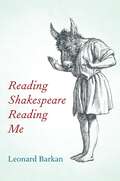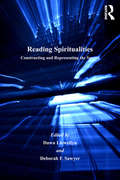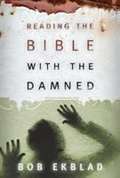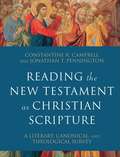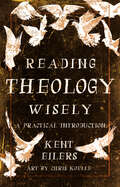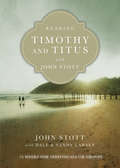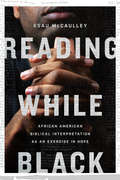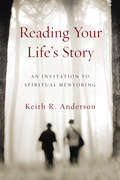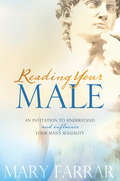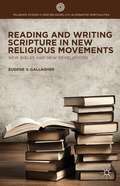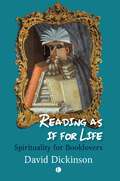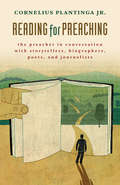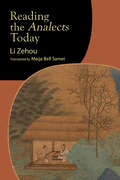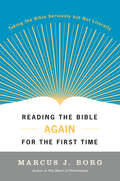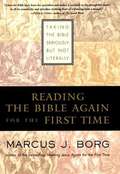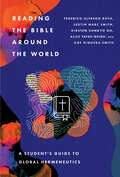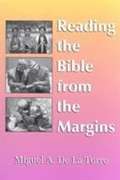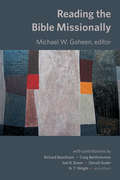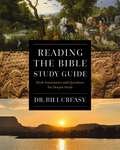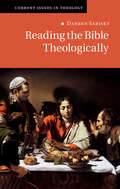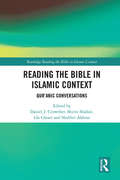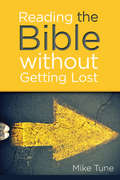- Table View
- List View
Reading Shakespeare Reading Me
by Leonard BarkanA gripping, funny, joyful account of how the books you read shape your own life in surprising and profound ways.Bookworms know what scholars of literature are trained to forget: that when they devour a work of literary fiction, whatever else they may be doing, they are reading about themselves. Read Shakespeare, and you become Cleopatra, Hamlet, or Bottom. Or at the very least, you experience the plays as if you are in a small room alone with them, and they are speaking to your life, your sensibility.Drawing on fifty years as a Shakespearean, Leonard Barkan has produced a captivating book that asks us to reconsider what it means to read. Barkan violates the rule of distance he was taught and has always taught his students. He asks: Where does this brilliantly contrived fiction actually touch me? Where is Shakespeare in effect telling the story of my life?King Lear, for Barkan, raises unanswerable questions about what exactly a father does after planting the seed. Mothers from Gertrude to Lady Macbeth are reconsidered in the light of the author’s experience as a son of a former flapper. The sonnets and comedies are seen through the eyes of a gay man who nevertheless weeps with joy when all the heterosexual couples are united at the end. A Midsummer Night’s Dream is interpreted through the author’s joyous experience of performing the role of Bottom and finding his aesthetic faith in the pantheon of antiquity. And the exquisitely poetical history play Richard II intersects with, of all things, Ru Paul’s Drag Race.Full of engrossing stories, from family secrets to the world of the theater, and written with humor and genuine excitement about literary experiences worthy of our attention and our love, Reading Shakespeare Reading Me makes Shakespeare’s plays come alive in new ways.
Reading Spiritualities: Constructing and Representing the Sacred (Breaking Feminist Waves Ser.)
by Dawn LlewellynThe phenomenon of 'sacred text' has undergone radical deconstruction in recent times, reflecting how religion has broken out of its traditional definitions and practices, and how current literary theories have influenced texts inside the religious domain and beyond. Reading Spiritualities presents both commentary and vivid examples of this evolution, engaging with a variety of reading practices that work with traditional texts and those that extend the notion of 'text' itself. The contributors draw on a range of textual sites such as an interview, Caribbean literature, drama and jazz, women's writings, emerging church blogs, Neopagan websites, the reading practices of Buddhist nuns, empirical studies on the reading experiences of Gujarati, Christian and post-Christian women, Chicana short stories, the mosque, cinema, modern art and literature. These examples open up understandings of where and how 'sacred texts' are emerging and being reassessed within contemporary religious and spiritual contexts; and make room for readings where the spiritual resides not only in the textual, but in other unexpected places. Reading Spiritualities includes contributions from Graham Holderness, Ursula King, Michael N. Jagessar, David Jasper, Anthony G. Reddie, Michèle Roberts, and Heather Walton to reflect and encourage the interdisciplinary study of sacred text in the broad arena of the arts and social sciences. It offers a unique and well-focused 'snapshot' of the textual constructions and representations of the sacred within the contemporary religious climate - accessible to the general reader, as well as more specialist interests of students and researchers working in the crossover fields of religious, theological, cultural and literary studies.
Reading The Bible With The Damned
by Bob EkbladExploring the challenges that both the churched and the unchurched have faced regarding giving and receiving the word of God, Bob Ekblad encourages us all to learn to read the Bible together as a whole. In this compelling book, he reflects on how Christians have often found it difficult to proclaim God's good news to every realm of society, while those who have needed it most have frequently deemed themselves unworthy due to social circumstances or sinfulness. In Reading the Bible with the Damned, Ekblad offers concrete advice on how to bridge this gap through a variety of insights ultimately leading to spiritual transformation. This book is full of examples of how Scripture changes lives for those who attend Bible studies and for those who lead them, offering practical suggestions on many passages from the Old and New Testaments.
Reading The New Testament as Christian Scripture: A Literary, Canonical, and Theological Survey (Reading Christian Scripture Ser.)
by Constantine R. Campbell Jonathan T. PenningtonThis survey textbook by two respected New Testament scholars is designed to meet the needs of contemporary evangelical undergraduates. The book effectively covers the New Testament books and major topics in the New Testament, assuming no prior academic study of the Bible. The authors pay attention to how the New Testament documents fit together as a canonical whole that supplements the Old Testament to make up the Christian Scriptures. They also show how the New Testament writings provide basic material for Christian doctrine, spirituality, and engagement with culture. Chapters can be assigned in any order, making this an ideal textbook for one-semester courses at evangelical schools. This is the first volume in a new series of survey textbooks that will cover the Old and New Testaments. The book features full-color illustrations that hold interest and aid learning and offers a full array of pedagogical aids: photographs, sidebars, maps, time lines, charts, glossary, and discussion questions. Additional resources for instructors and students are available through Textbook eSources.
Reading Theology Wisely: A Practical Introduction
by Kent Eilers&“Could reading theology turn you toward God in astonished worship? Could it enliven your reading of Scripture? Could it move you toward your true self in Christ? Could it turn you toward your neighbors in self-giving love? Could it unmask your prejudices? Could it dethrone your idols? Should we hope for anything less?&” In this illuminating introduction, Kent Eilers invites Christians of all backgrounds into the practice of reading theology. With a classroom-tested approach, Eilers shows how theology can form the imagination and enhance &“the human capacity for perceiving reality beyond the surface of things&”—allowing Christians to see and experience God in the everyday. He then guides readers through the essential facets of theology so that it can begin to feel familiar and accessible, even (and especially) to beginners with no prior experience. Written conversationally and illustrated beautifully with art by Chris Koelle, Reading Theology Wisely is welcoming and engaging in every respect. Eilers takes a well-rounded approach to his subject, utilizing Scripture and the wisdom of past thinkers as well as references to film and the arts—including a special emphasis on architecture as part of an ongoing metaphor of &“inhabiting texts&” as we do physical spaces. Each chapter ends with a prayer and questions for reflection and discussion, followed by a &“theology lab&” in which readers can put the content of the preceding chapter into practice.
Reading Timothy and Titus with John Stott: 13 Weeks for Individuals or Groups (Reading the Bible with John Stott Series)
by John StottThe Message of Timothy & TitusThe Message of 2 Timothy
Reading While Black: African American Biblical Interpretation as an Exercise in Hope
by Esau McCaulleyGrowing up in the American South, Esau McCaulley knew firsthand the ongoing struggle between despair and hope that marks the lives of some in the African American context. A key element in the fight for hope, he discovered, has long been the practice of Bible reading and interpretation that comes out of traditional Black churches. This ecclesial tradition is often disregarded or viewed with suspicion by much of the wider church and academy, but it has something vital to say. Reading While Black is a personal and scholarly testament to the power and hope of Black biblical interpretation. At a time in which some within the African American community are questioning the place of the Christian faith in the struggle for justice, New Testament scholar McCaulley argues that reading Scripture from the perspective of Black church tradition is invaluable for connecting with a rich faith history and addressing the urgent issues of our times. He advocates for a model of interpretation that involves an ongoing conversation between the collective Black experience and the Bible, in which the particular questions coming out of Black communities are given pride of place and the Bible is given space to respond by affirming, challenging, and, at times, reshaping Black concerns. McCaulley demonstrates this model with studies on how Scripture speaks to topics often overlooked by white interpreters, such as ethnicity, political protest, policing, and slavery. Ultimately McCaulley calls the church to a dynamic theological engagement with Scripture, in which Christians of diverse backgrounds dialogue with their own social location as well as the cultures of others. Reading While Black moves the conversation forward.
Reading Your Life's Story: An Invitation to Spiritual Mentoring
by Keith R. AndersonSpiritual mentoring is a particular kind of friendship in which, according to Keith R. Anderson, "two or more people walk together in heightened awareness of the presence of yet Another"—the Holy Spirit. "Spiritual mentoring is not a complicated process that requires technical training and complex protocol," Anderson continues. "It is essential, authentic, and maybe even natural human speech that is focused, disciplined and nurtured by training for one of the hardest natural things we do: listening reflectively to another. It is sacred companionship as life is lived and story told. Available to almost all, it requires deliberate recruitment, preparation and practice." These pages unfold a vision for mentoring that invites us to read our own lives as narrative and to learn how to enter the narrative of another life. The book covers the scope of the mentoring relationship through various seasons, offering helpful and inspiring metaphors for mentoring. All are invited to enter the mentoring story.
Reading Your Male
by Mary FarrarThere is a growing crisis among our men and boys in the area of sexual temptation and sin: pornography use is skyrocketing and increasing numbers of men find themselves entangled in a web they can't seem to escape. Yet many men feel greatly misunderstood by their women, while just as many women feel mystified and powerless to help their men.--Mary Farrar, Reading Your MaleNow author Mary Farrar confirms that every woman--whether a wife, mother, or single woman--can play a powerful and pivotal role in the male sexual struggle by entering into her man's world, and: seeing through his eyes, thinking with his mind, feeling with his emotions, connecting with his soul.Reading Your Male de-mystifies inner male sexuality, exposes the enemy's tactics in taking down our men, and equips women to use their innate gifts in becoming a man's greatest ally in the fight for victory. Using biblical insight and up-to-date research, Farrar also tackles some of the most elusive questions women are asking today, such as: Why do men struggle so deeply in the area of sexuality? What are we to think about pornography and masturbation? Why does this generation of men appear to be so reticent? What does a man crave most from a woman? What is a woman's most powerful gift to her man? How can a woman draw out an emotionally unavailable man? What is a healthy view of strong femininity and beauty?
Reading and Writing During the Dissolution
by Mary C. ErlerIn the years from 1534, when Henry VIII became head of the English church, until the end of Mary Tudor's reign in 1558, the forms of English religious life evolved quickly and in complex ways. At the heart of these changes stood the country's professed religious men and women, whose institutional homes were closed between 1535 and 1540. Records of their reading and writing offer a remarkable view of these turbulent times. The responses to religious change of friars, anchorites, monks and nuns from London and the surrounding regions are shown through chronicles, devotional texts, and letters. What becomes apparent is the variety of positions that English religious men and women took up at the Reformation and the accommodations that had to be made, both spiritual and practical. Of particular interest are the extraordinary letters of Margaret Vernon, head of four nunneries and personal friend of Thomas Cromwell.
Reading and Writing Scripture in New Religious Movements
by Eugene V. GallagherNew religious movements both read the Bible in creative ways and produce their own texts that aspire to scriptural status. From the creation stories in Genesis and the Ten Commandments to the life of Jesus and the apocalypse, they develop their self-understandings through reading and writing scripture.
Reading as if for Life: Spirituality for Booklovers
by David DickinsonCreaking open the pages of a heavy hardback, or bending the spine of a poetry book over your knee on the train; squinting over curled-up pages by the light of a candle, or scribbling notes in the margins in the corner of a sprawling library. There are many who read as if for life; many for whom, as David Dickinson explores, reading does not just feed the mind but also the soul. Reading as if for Life takes us beyond the spirituality of sacred texts, and into the spiritual possibilities of 'secular' literature: the opportunity to find or empty oneself, the chance to engage in silent conversation with an absent other, the appreciation of beauty and art, the possibility of enlightenment. From Augustine of Hippo to Thomas Hardy, Iris Murdoch, the poetry of R.S. Thomas, Duffy and Donne, and many other literary works, David Dickinson explores how writers throughout the centuries have understood and experienced their own spirituality of reading. For Dickinson, these myriad journeys all bring us closer to an encounter with God, dreaming ourselves into a world beyond. This book invites its readers to see reading as a valuable spiritual exercise.
Reading for Preaching: The Preacher in Conversation with Storytellers, Biographers, Poets, and Journalists
by Cornelius Plantinga Jr.In Reading for Preaching Cornelius Plantinga makes a striking claim: preachers who read widely will most likely become better preachers.Plantinga -- himself a master preacher -- shows how a wide reading program can benefit preachers. First, he says, good reading generates delight, and the preacher who enters the world of delight goes with God. Good reading can also help tune the preacher’s ear for language -- his or her primary tool. General reading can enlarge the preacher’s sympathies for people and situations that she or he had previously known nothing about. And, above all, the preacher who reads widely has the chance to become wise.This beautifully written book will benefit not just preachers but anyone interested in the wisdom to be derived from reading.Works that Plantinga interacts with in the book includeThe Kite Runner, by Khaled HosseiniEnrique's Journey, by Sonia NazarioSilence, by Shusaku Endo"How Much Land Does a Man Need?" by Leo Tolstoy"Narcissus Leaves the Pool" by Joseph EpsteinLes Miserables, by Victor Hugo. . . and many more!
Reading the Analects Today (SUNY series, Translating China)
by Zehou LiOne of China's most prominent contemporary philosophers reads and comments on one of the central texts in the Chinese philosophical tradition.In this book, one of contemporary China's most prominent philosophers, Li Zehou, explores one of the central texts in the Chinese philosophical tradition, the Analects of Confucius. While the book provides an introduction to the Analects itself and to Confucianism in general, it also serves as an introduction to Li's own thought, particularly the ways in which he regarded the Confucian tradition as relevant to postrevolutionary contemporary China. Key topics include the role of Confucianism in the Chinese tradition and in contemporary China; Confucianism's quasi-religious, quasi-philosophical character; Li's views on emotion, morality, and fate in Confucianism; and his call for a separation of public social morality from private religious morality in modern China. Translated here by Maija Bell Samei, Reading the "Analects" Today is among the most accessible of Li Zehou's works and will be of interest not only to philosophers but to scholars and students of both modern and traditional Chinese intellectual, social, and religious history.
Reading the Bible Again For the First Time: Taking the Bible Seriously But Not Literally
by Marcus J. BorgOne of the vital challenges facing thoughtful people today is how to read the Bible faithfully without abandoning our sense of truth and history. Reading the Bible Again for the First Time provides a much-needed solution to the problem of how to have a fully authentic yet contemporary understanding of the scriptures. Many mistakenly believe there are no choices other than fundamentalism or simply rejecting the Bible as something that can bring meaning to our lives. Answering this modern dilemma, acclaimed author Marcus Borg reveals how it is possible to reconcile the Bible with both a scientific and critical way of thinking and our deepest spiritual needs, leading to a contemporary yet grounded experience of the sacred texts.This seminal book shows you how to read the Bible as it should be examined--in an approach the author calls "historical-metaphorical." Borg explores what the Scriptures meant to the ancient communities that produced and lived by them. He then helps us to discover the meaning of these stories, providing the knowledge and perspective to make the wisdom of the Bible an essential part of our modern lives. The author argues that the conventional way of seeing the Bible's origin, authority, and interpretation has become unpersuasive to millions of people in our time, and that we need a fresh way of encountering the Bible that takes the texts seriously but not literally, even as it takes seriously who we have become.Borg traces his personal spiritual journey, describing for readers how he moved from an unquestioning childhood belief in the biblical stories to a more powerful and dynamic relationship with the Bible as a sacred text brimming with meaning and guidance. Using his own experience as an example, he reveals how the modern crisis of faith is itself rooted in the misinterpretation of sacred texts as historical record and divine dictation, and opens readers to a truer, more abundant perspective.This unique book invites everyone--whatever one's religious background--to engage the Bible, wrestle with its meaning, explore its mysteries, and understand its relevance. Borg shows us how to encounter the Bible in a fresh way that rejects the limits of simple literalism and opens up rich possibilities for our lives.
Reading the Bible Again for the First Time: Taking the Bible Seriously but Not Literally
by Marcus J. BorgOne of the vital challenges facing thoughtful people today is how to read the Bible faithfully without abandoning our sense of truth and history. Reading the Bible Again for the First Time provides a much-needed solution to the problem of how to have a fully authentic yet contemporary understanding of the scriptures. Many mistakenly believe there are no choices other than fundamentalism or simply rejecting the Bible as something that can bring meaning to our lives. Answering this modern dilemma, acclaimed author Marcus Borg reveals how it is possible to reconcile the Bible with both a scientific and critical way of thinking and our deepest spiritual needs, leading to a contemporary yet grounded experience of the sacred texts. This seminal book shows you how to read the Bible as it should be examined -- in an approach the author calls "historical-metaphorical." Borg explores what the Scriptures meant to the ancient communities that produced and lived by them. He then helps us to discover the meaning of these stories, providing the knowledge and perspective to make the wisdom of the Bible an essential part of our modern lives. The author argues that the conventional way of seeing the Bible's origin, authority, and interpretation has become unpersuasive to millions of people in our time, and that we need a fresh way of encountering the Bible that takes the texts seriously but not literally, even as it takes seriously who we have become. Borg traces his personal spiritual journey, describing for readers how he moved from an unquestioning childhood belief in the biblical stories to a more powerful and dynamic relationship with the Bible as a sacred text brimming with meaning and guidance. Using his own experience as an example, he reveals how the modern crisis of faith is itself rooted in the misinterpretation of sacred texts as historical record and divine dictation, and opens readers to a truer, more abundant perspective. This unique book invites everyone -- whatever one's religious background -- to engage the Bible, wrestle with its meaning, explore its mysteries, and understand its relevance. Borg shows us how to encounter the Bible in a fresh way that rejects the limits of simple literalism and opens up rich possibilities for our lives.
Reading the Bible Around the World: A Student’s Guide to Global Hermeneutics
by Justin Marc Smith Kay Higuera Smith Federico Alfredo Roth Kirsten Sonkyo Oh Alice Yafeh-DeighIt's an exciting time to be reading the Bible.Reading the Bible Around the WorldWho we are shapes how we read. Guided by these expert teachers, readers will gain a deeper understanding of the influence of their own social location and how to keep growing in biblical wisdom by reading alongside the global Christian community.
Reading the Bible From the Margins
by Miguel A. De La TorreDescribing how "standard" readings of the Bible are not always acceptable to people or groups on the "margins," this book afters valuable new insights into biblical texts today.
Reading the Bible Missionally (The Gospel and Our Culture Series (GOCS))
by Michael GoheenAcademy of Parish Clergy&’s Top Ten Books for Parish MinistryInsights from a noteworthy convergence of top scholars in biblical studies and missiology Over the past half century, it has become clear that mission is a central theme in the Bible's narrative and, moreover, is central to the very identity of the church. This book significantly widens and deepens the emerging conversation on missional hermeneutics. Essays from top biblical and missiological scholars discuss reading the Scriptures missionally, using mission as a key interpretive lens. Five introductory chapters probe various elements of a missional hermeneutic, followed by sections on the Old and New Testaments that include chapters on two books from each to illustrate what a missional reading of them looks like. Essays in two concluding sections draw out the implications of a missional reading of Scripture for preaching and for theological education.CONTRIBUTORS Craig G. Bartholomew Richard Bauckham Carl J. Bosma Tim J. Davy Dean Flemming John R. Franke Mark Glanville Michael W. Goheen Joel B. Green Darrell L. Guder George R. Hunsberger Timothy M. Sheridan Christopher J. H. Wright N. T. Wright
Reading the Bible Missionally (The Gospel and Our Culture Series (GOCS))
by Michael GoheenAcademy of Parish Clergy’s Top Ten Books for Parish MinistryInsights from a noteworthy convergence of top scholars in biblical studies and missiology Over the past half century, it has become clear that mission is a central theme in the Bible's narrative and, moreover, is central to the very identity of the church. This book significantly widens and deepens the emerging conversation on missional hermeneutics. Essays from top biblical and missiological scholars discuss reading the Scriptures missionally, using mission as a key interpretive lens. Five introductory chapters probe various elements of a missional hermeneutic, followed by sections on the Old and New Testaments that include chapters on two books from each to illustrate what a missional reading of them looks like. Essays in two concluding sections draw out the implications of a missional reading of Scripture for preaching and for theological education.CONTRIBUTORS Craig G. Bartholomew Richard Bauckham Carl J. Bosma Tim J. Davy Dean Flemming John R. Franke Mark Glanville Michael W. Goheen Joel B. Green Darrell L. Guder George R. Hunsberger Timothy M. Sheridan Christopher J. H. Wright N. T. Wright
Reading the Bible Study Guide: Book Summaries and Questions for Deeper Study
by William C. CreasyFollowing the structure of Reading the Bible, this corresponding study guide offers assessment questions, exercises, and visuals designed to support deep learning experiences in each book of the Bible by unveiling its rich literary genres and ancient Near Eastern origins. Recognized as among the top two percent of educators in the U.S., Creasy challenges the notion that the Bible is simply an anthology, instead revealing it as a collection of 'little books' that warrant meticulous exploration.The Reading the Bible Study Guide includes:Maps to help understand the land of the Bible betterQuestions about the narrative features of each biblical bookSummaries of the chapters from the main bookDiscussion questions to facilitate group engagement in classroom, church, or small group settings With the aim of nurturing "knowledgeable readers of Scripture" who can both comprehend and apply its teachings within their own life, this study guide serves as an indispensable guide for those seeking a profound understanding of the world's most influential text.For use with Reading the Bible by Dr. Bill Creasy. Together, the book and study guide make a perfect combination for group Bible study programs in churches, schools, and seminaries!
Reading the Bible Theologically (Current Issues in Theology #13)
by Darren SariskyTheological interpretation of the Bible is one of the most significant debates within theology today. Yet what exactly is theological reading? Darren Sarisky proposes that it requires identification of the reader via a theological anthropology; an understanding of the text as a collection of signs; and reading the text with a view toward engaging with what it says of transcendence. Accounts of theological reading do not often give explicit focus to the place of the reader, but this work seeks to redress this neglect. Sarisky examines Augustine's approach to the Bible and how his theological insights into the reader and the text generate an aim for interpretation, which is fulfilled by fitting reading strategies. He also engages with Spinoza, showing that theological exegesis contrasts not with approaches that take history seriously, but with naturalistic approaches to reading.
Reading the Bible as God's Own Story
by William S. KurzThis small book endeavors to expound on the views of the early church Fathers, particularly St. Irinaus. The book is scholarly and not always easy to follow. Nevertheless, it does try to explain symbolism and metaphor.
Reading the Bible in Islamic Context: Qur'anic Conversations (Routledge Reading the Bible in Islamic Context Series)
by Shirin Shafaie Shabbir Akhtar Daniel J Crowther Ida GlaserIn the current political and social climate, there is increasing demand for a deeper understanding of Muslims, the Qur’an and Islam, as well as a keen demand among Muslim scholars to explore ways of engaging with Christians theologically, culturally, and socially. This book explores the ways in which an awareness of Islam and the Qur’an can change the way in which the Bible is read. The contributors come from both Muslim and Christian backgrounds, bring various levels of commitment to the Qur’an and the Bible as Scripture, and often have significantly different perspectives. The first section of the book contains chapters that compare the report of an event in the Bible with a report of the same event in the Qur’an. The second section addresses Muslim readings of the Bible and biblical tradition and looks at how Muslims might regard the Bible - Can they recognise it as Scripture? If so, what does that mean, and how does it relate to the Qur’an as Scripture? Similarly, how might Christian readers regard the Qur’an? The final section explores different analogies for understanding the Bible in relation to the Qur’an. The book concludes with a reflection upon the particular challenges that await Muslim scholars who seek to respond to Jewish and Christian understandings of the Jewish and Christian scriptures. A pioneering venture into intertextual reading, this book has important implications for relationships between Christians and Muslims. It will be of significant value to scholars of both Biblical and Qur’anic Studies, as well as any Muslim seeking to deepen their understanding of the Bible, and any Christian looking to transform the way in which they read the Bible.
Reading the Bible without Getting Lost
by Mike Tune"Scripture did not spring from the imaginations of ancient men, but holy men spoke and wrote as they were carried along by the Spirit of God" (2 Pet. 1:21). This simple handbook serves as a guide to help beginning readers of the Bible arrive where the Spirit intended.The Bible is a vast library of writings spanning centuries and cultures. It can be daunting and confusing for inexperienced Bible readers. Reading the Bible without Getting Lost gets to the heart of every book of the Bible and provides a reader's roadmap through each one. In addition, it provides an overview of the biblical story, a brief treatment of types of literature in the Bible, and a simple guide to studying the Bible.There are many books on biblical interpretation and many hefty introductions to the Bible, but this book joins the two into a manageable size and simple presentation for beginning Bible students.
